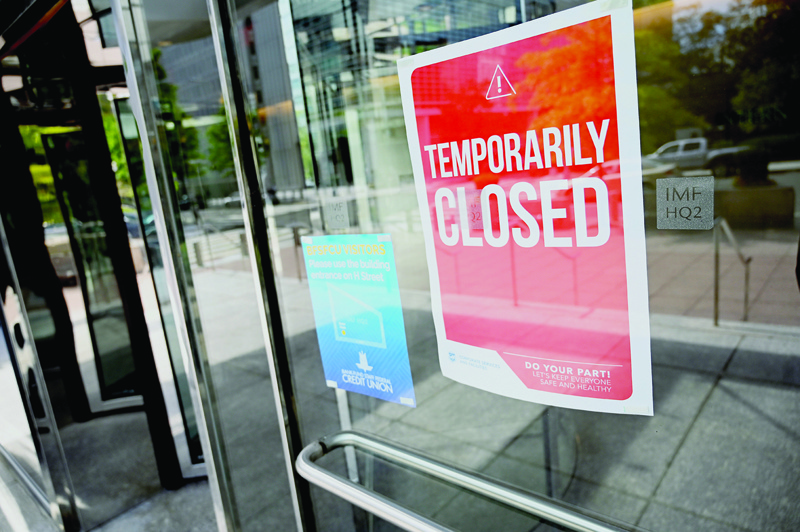
NEW YORK: Amid a flood of government spending, the global downturn sparked by the coronavirus pandemic will not be as bad as originally feared, IMF chief Kristalina Georgieva said yesterday, but she warned that the crisis is far from over. "The picture today is less dire … allowing for a small upward revision to our global forecast for 2020," she said in a speech ahead of IMF-World Bank autumn meetings next week, when the IMF is due to present its updated forecasts.
In June, the Washington-based crisis lender projected a nearly five percent contraction of global GDP, but results in the second and third quarters were better than expected. Georgieva credited the "extraordinary policy measures that put a floor under the world economy" which amounted to $12 trillion in fiscal support to households and firms.
But she warned governments not to prematurely withdraw the help they have provided, since the outlook for next year is mixed and rife with uncertainties and risks. After more than a million deaths, "this calamity is far from over. All countries are now facing what I would call 'The Long Ascent'-a difficult climb that will be long, uneven, and uncertain," Georgieva said.
In the United States and Europe the downturn, though painful, was not as bad as economists feared at the outset, and China is seeing "a faster-than-expected recovery." But the news elsewhere is bad: "In low-income countries, the shocks are so profound that we face the risk of a 'lost generation,'" she said. "There is also now the risk of severe economic scarring from job losses, bankruptcies, and the disruption of education." Low-income countries have not had the resources to spend as much to support jobs and businesses, and also will need help to deal with their debt burden, including through more grants and debt restructuring.
She likened the crisis to World War II when leaders "forged a better world in the worst possible moment," and called for governments to continue support for workers as long as it is needed, while spending to create a better, more equitable, economic system. "Where the pandemic persists, it is critical to maintain lifelines across the economy, to firms and workers," she said. "Cut the lifelines too soon, and the Long Ascent becomes a precipitous fall."
But, Georgieva said, "We cannot afford simply to rebuild the old economy, with its low growth, low productivity, high inequality, and worsening climate crisis," and she called for more spending on green jobs which can generate more employment. "This will require both stimuli for job creation, especially in green investment, and cushioning the impact on workers," she said. "Safeguarding social spending will be critical for a just transition to new jobs." She referred to an IMF report released Monday showing that increasing spending by just one percent of GDP could create 33 million new jobs.
Central role
Public investment should play a "central role" in boosting the economies of emerging and advanced economies as they struggle to recover from the coronavirus downturn, the IMF said. With interest rates at rock bottom around the world, the Washington-based crisis lender said now is the time for governments to take action to create jobs by reviving delayed infrastructure projects and tackling new ones, as well as by investing in maintenance. "We are in this unprecedented situation of very low cost of borrowing, crumbling infrastructure, even in the advanced economies," said Paolo Mauro, head of the IMF's fiscal affairs department. "Public investment can provide that support to economic activity and job creation that is needed."
Fund officials, especially IMF chief Georgieva, since the start of the pandemic have been stressing the need to ramp up spending to buffer against the impact of the sharp global downturn, an unusual stance for the organization that has long preached fiscal responsibility and caution about debt levels. But even before the pandemic, public investment "had been weak for over a decade, despite crumbling roads and bridges in some advanced economies and massive infrastructure needs for transportation, clean water, sanitation" in poorer nations, the IMF said in a report released ahead of its annual meeting next week.
With many countries still fighting off Covid-19 and many people who lost their jobs amid the pandemic looking for work, the IMF estimates that every $1 million spent on traditional infrastructure creates two to eight jobs, while the same amount spent on research, development and green technology can create five to 14 new positions. Boosting public investment by just one percent of GDP could create between two and three million jobs in the European Union, and nearly two million jobs in the United States, Mauro said.
Public to private
And when governments start investing more, the IMF expects the private sector to follow. Assuming investments are of "high quality," the IMF said increasing public investment by one percent of GDP could raise private investment by 10 percent, employment by 1.2 percent, and GDP by 2.7 percent, as well as shoring up overall confidence in the recovery. The IMF encouraged governments to take a second look at projects that had been delayed in the past and plan new ones focused on their needs after the pandemic is over, but also encouraged economies of all sizes not to neglect existing infrastructure. - Agencies











